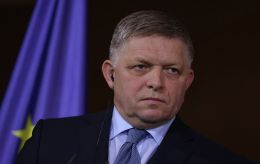Kremlin tightens control over migrants for sake of ultranationalists - ISW
 Russia is ready to sacrifice economic interests for the sake of political stability (Illustrative photo: Getty Images)
Russia is ready to sacrifice economic interests for the sake of political stability (Illustrative photo: Getty Images)
Russian authorities are focusing on internal political stability and implementing stricter, total control over migrants. In this way, the Kremlin is attempting to appease excessively xenophobic ultranationalists, reports the American Institute for the Study of War (ISW).
The Ministry of Internal Affairs (MIA) of the Russian Federation has implemented a new migration regime starting from February 5, imposing strict restrictions on migrants residing in the country.
The law requires migrants who have committed criminal offenses or lack proper documents to register with Russian authorities, regularly send geolocation photos to the MIA, and obtain permission from the agency for certain activities. These activities include purchasing real estate, driving a vehicle, accessing banking services, and traveling outside their designated region.
The law grants the MIA the authority to deport migrants who violate these restrictions without a court hearing and to punish those who provide services to undocumented migrants.
The head of the Investigative Committee of Russia, Alexander Bastrykin, stated that crimes associated with migrants remain a serious problem for Russian authorities and society. He mentioned that in 2024, the number of legal cases against migrants increased by 18%.
The ISW believes that Bastrykin's statements reinforce ultranationalist narratives in Russia, portraying migrants as a security threat, allegedly violating laws, moving unchecked across the country, and committing crimes.
The Institute considers the new migration regime introduced by the Ministry of Internal Affairs and Bastrykin's rhetoric to reflect the Kremlin's increased efforts to calm particularly militaristic, xenophobic Russian ultranationalists.
"The new MVD migration regime and Bastrykin's rhetoric demonstrate that Russian authorities are increasingly prioritizing efforts to appease particularly pro-war, xenophobic Russian ultranationalists and mitigate potential domestic security risks linked to rising anti-migrant sentiment rather than offsetting Russia's labor shortages and ongoing economic struggles, in part, with migrant labor," the ISW report states.
Russia's policy on migrants
The Russian authorities are attempting to attract migrants from Central Asia to support the economy. However, a significant issue is the hostility toward these ethnic groups from the pro-war ultranationalist electorate. Moscow is exploring ways to reconcile migrants with ethnic Russians.
Additionally, the Kremlin is deceiving migrants into joining the war against Ukraine, often through fake promises of employment opportunities within the country.
Last autumn, the president of Chechnya, Ramzan Kadyrov, announced plans to send 84,000 residents of the republic to fight in Russia’s war against Ukraine. People are reportedly being transported to the front under the guise of voluntary participation.

